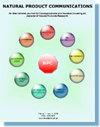通过网络药理学和体外验证探索藿香正气口服液防治蚊虫叮咬皮炎的机制
IF 1.4
4区 医学
Q4 CHEMISTRY, MEDICINAL
引用次数: 0
摘要
目的中成药藿香正气口服液(HXZQOL)可外用治疗蚊虫叮咬性皮炎(MBD)。本研究旨在基于网络药理学和实验验证,探讨 HXZQOL 治疗 MBD 的潜在机制。研究方法利用 TCMSP、SwissTargetPrediction 和 PubChem 数据库预测 HXZQOL 的活性化合物和靶点,利用 GeneCards 数据库预测 MBD 的潜在靶点。使用 Venn 数据库进行了靶点相互作用分析,使用 String 数据库和 Cytoscape 评估了 PPI 和核心靶点。使用 David 在线工具对基因本体(GO)和京都基因组百科全书(KEGG)通路进行了富集分析。使用 Cytoscape 构建了 "HXZQOL-化合物-目标-途径-MBD "网络。分子对接使用 Autodock vina 进行。建立了 TNF-a/IFN-γ 诱导的 HaCaT 细胞炎症模型,用 Elisa 和 Western Blot 评估炎症因子和 IL-7 信号通路相关蛋白的水平,以验证 HXZQOL 抗 MBD 的机制。结果HXZQOL含有154种活性化合物,与MBD有88个共同靶点。槲皮素、芹菜素、熊果酸和木犀草素被确定为潜在的候选化合物,而 JUN、IL-6、TNF 和 VEGFA 被认为是主要的潜在靶点。研究发现,HXZQOL 可通过多种途径作用于 MBD,包括 IL-17、AGE-RAGE 和 TNF 信号途径。候选化合物与 JUN 和 IL-6 靶点有效结合,结合能低于 -5 kcal/mol。Western blot 实验证实,这些化合物可以下调 IL-17 信号通路中 JUN 蛋白的表达,并显著降低 HaCaT 细胞中炎症因子 TNF-α、IL-6 和 NO 的水平。结论HXZQOL主要通过减轻炎症反应来发挥抗MAD作用。相关结果为提高 HXZQOL 的局部抗 MBD 作用和 HXZQOL 制剂的二次开发奠定了基础。本文章由计算机程序翻译,如有差异,请以英文原文为准。
Exploring the Mechanism of Huoxiang Zhengqi Oral Liquid Against Mosquito Bite Dermatitis Through Network Pharmacology and in Vitro Validation
Objective: Traditional Chinese patent medicine Huoxiang Zhengqi Oral Liquid (HXZQOL) can be used topical to treat mosquito bite dermatitis (MBD). The study aimed to explore the potential mechanism of HXZQOL in treatment of MBD based on network pharmacology and experimental validation. Methods: TCMSP, SwissTargetPrediction and PubChem database were used to predict the active compounds and targets of HXZQOL and GeneCards database was utilized to predict the potential targets of MBD. Target interaction analysis was performed using Venn database, PPI and core targets were assessed using String database, and Cytoscape. Enrichment analysis on Gene Ontology(GO) and Kyoto Encyclopedia of Genes and Genomes (KEGG) pathways were performed using David online tool. “HXZQOL-compound-target-pathway-MBD” networks were constructed using Cytoscape. Molecular docking was carried out with Autodock vina. The inflammation model of HaCaT cells induced by TNF-a/IFN-γ was established .to validate the mechanism of HXZQOL against MBD, with the levels of inflammatory factors and protein related to IL-7 signaling pathway assessed using Elisa and Western Blot. Results: HXZQOL contained 154 active compounds and shared 88 common targets with MBD. Quercetin, apigenin, ursolic acid and luteolin were identified as potential candidate compounds, while JUN, IL-6, TNF and VEGFA were suggested as main potential targets. HXZQOL was found to act on MBD through multiple pathways including IL-17, AGE-RAGE and TNF signaling pathways. The candidate compounds demonstrated effectively binding to JUN and IL-6 targets, with binding energies below −5 kcal/mol. Western blot experiments confirmed that these compounds could down-regulate the expression of JUN protein in IL-17 signaling pathway, and significantly reduce levels of inflammatory factors TNF-α, IL-6 and NO in HaCaT cells. Conclusion: HXZQOL mainly exerts its anti MAD effect by reducing inflammation. The relevant results have laid the foundation for improving the local anti MBD effect of HXZQOL and the secondary development of HXZQOL formulations.
求助全文
通过发布文献求助,成功后即可免费获取论文全文。
去求助
来源期刊

Natural Product Communications
工程技术-食品科技
CiteScore
3.10
自引率
11.10%
发文量
254
审稿时长
2.7 months
期刊介绍:
Natural Product Communications is a peer reviewed, open access journal studying all aspects of natural products, including isolation, characterization, spectroscopic properties, biological activities, synthesis, structure-activity, biotransformation, biosynthesis, tissue culture and fermentation. It covers the full breadth of chemistry, biochemistry, biotechnology, pharmacology, and chemical ecology of natural products.
Natural Product Communications is a peer reviewed, open access journal studying all aspects of natural products, including isolation, characterization, spectroscopic properties, biological activities, synthesis, structure-activity, biotransformation, biosynthesis, tissue culture and fermentation. It covers the full breadth of chemistry, biochemistry, biotechnology, pharmacology, and chemical ecology of natural products.
Natural Product Communications is a peer reviewed, open access journal studying all aspects of natural products, including isolation, characterization, spectroscopic properties, biological activities, synthesis, structure-activity, biotransformation, biosynthesis, tissue culture and fermentation. It covers the full breadth of chemistry, biochemistry, biotechnology, pharmacology, and chemical ecology of natural products.
 求助内容:
求助内容: 应助结果提醒方式:
应助结果提醒方式:


